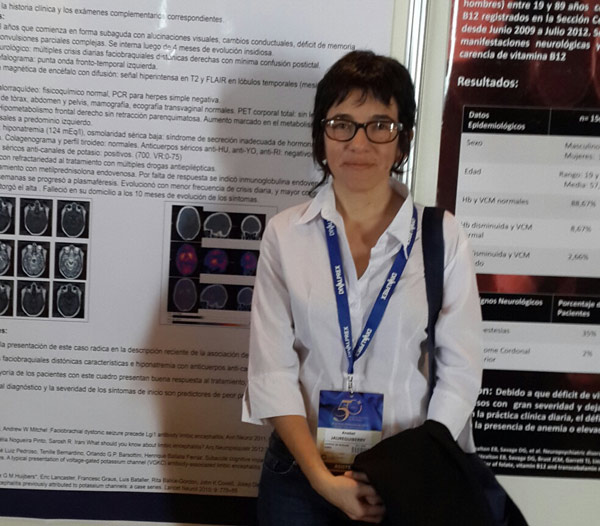Joseba Etxarri/EuskalKultura.com. This descendant of Basques from Lower Navarre is a clear example of a well-trained young professional, who is active and has concerns. She is dedicated to Neuroimmunology in Argentina’s capital and takes care of patients, in particular those with multiple sclerosis as well as people with neurological complications and infectious diseases, especially HIV or the AIDS virus.
-Out of curiosity, what is your title in Argentina?
-Medical neurologist; in Spanish 'médica neuróloga'; or 'mediku neurologoa' in Basque.
-Was this your vocation?
-In reality, I began my University studies to become a neurosurgeon, but later I changed my mind, I got bored, since you have to like anatomy a lot to do that. In my third year I changed my focus to Neurology and in the first two years if residency I had decided what I wanted to specialize in.
-Is your specialty covered by public healthcare?
-In Argentina there are three systems of medical or health care: public, that is free and universal and covers everyone, Argentineans and foreigners alike; social work or 'obra social', which depends on guilds or unions, or trade, with each one having its own program; and 'Prepaga', that is completely private. In Neurology there are very good public services. I did my residency in a public hospital and then worked in all three systems.
-For the uninitiated, what exactly is Neuroimmunology?
-We tread neurologic diseases that originate in the immune system. The nervous system is attacked and that causes disease. I treat patients in particular with multiple sclerosis, a disease that we know better now. The majority of those affected are young, above all, but not exclusively, women. It is degenerative disease that has a center in Barcelona, the Multiple Sclerosis Center of Catalonia (CEMCAT), that is a reference worldwide, directed by Dr. Xavier Montalban. I was fortunate enough to have visited it recently, returning from a conference in Istanbul, and I took a course for a few days, even though the rest of my training and education took place in Argentina.
-You are a descendant of Jean Jaureguiberry, a Basque from Lower Navarre, who immigrated to Argentina in the first half of the 19th Century, first stopping in Uruguay. What is left of your Basque origin in your family? I imagine that such a last name has marked you.
-I would say that our family knows that our last name is Basque and that we have present the famous “Basque word,” or the reputation of stubborn Basques. But not much more. After generations, I am the first to have learned and once again speaks Basque.
-How is that?
-It was rather curios. Everyone told me that my last name was Basque, and asked if I was Basque, so I thought, at the time, that I couldn’t be such a stranger to the language and culture and I thought that it was at least worth a small effort to try and understand it, as well as to get to know my roots better. That is when I had a little more free time from my work and studies, I looked in Buenos Aires and in 2008 I found Euskaltzaleak, the euskaltegi or academy that has taught Basque here since 1944. I liked it, and got involved with a group; I made friends and continued until 2012 when I passed the first level exam with HABE.
-What did it feel like when you could speak Basque and got your diploma?
-It was a feeling of great satisfaction because I had never gone to a Barnetegi (internship) in the Basque Country. All of my classes took place in Euskaltzaleak, here. Now I still go to mintza-praktika because that is what is lacking here. I can say that now I have begun teaching elementary Basque to those who are just starting out.
-Euskaltzaleak, the Basque school you belong to in Buenos Aires, will celebrate its 70th Anniversary next Tuesday, at a great time for the institution.
-The clubhouse that we purchased with loans from our own members is in full swing. We are a group of people with a lot of drive and enthusiasm. At Euskaltzaleak you learn, share, and in reality it is a group of friends, nothing stiff, where you go to have a good time, because you want to, even if it means working. Besides Euskera, there are other cultural and participative activities like workshops, from trikitixa to choir; there is a dance group, txalaparta, film, alboka, pandero, talks etc. Tuesday’s event will be one where we won’t have to work; it will be at a restaurant where we will be served. We’ll have dinner; there will be music, songs, and dancing. We’ll switch between Spanish and Basque here in Buenos Aires because that is how we feel and we like it.






 Send to a friend
Send to a friend Add comment
Add comment








